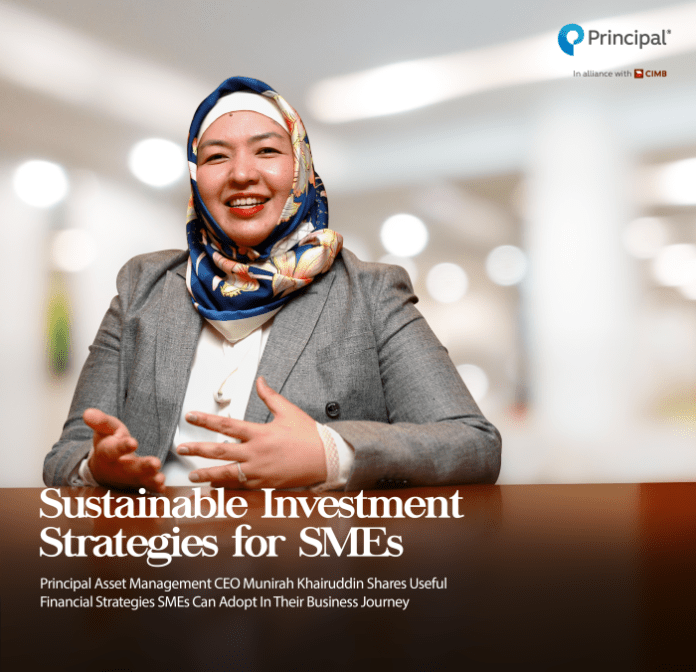Principal Asset Management Berhad’s CEO and Country Head, Munirah Khairuddin discusses why Small Medium Enterprises (SME) must start their Environmental Social Governance (ESG) journey now.
According to the Department of Statistics and SMECorp, there are more than 1.2 million SMEs representing 97% (source: SMECorp profile for SMEs) of overall business in the country. Undoubtedly a critical component of the Malaysian economy, the sector contributes more than a third of gross domestic product (GDP) and provides job opportunities to more than 4 million employees.
A vibrant sector that requires extensive financial support, for decades the SME industry has been well backed by investors either from financial institutions, investment companies, or private equity firms. However, with an increased focus on ESG as a key consideration before investors would invest, Malaysian SMEs will have to step up their game to attract funding to grow.
In fact, SME investors look for investment returns where risk mitigation is strong. Before only a few investors considered ESG factors, today two-thirds of corporate investors consider ESG factors according to a survey conducted by EY in 2021 (source: EY Institutional Investor Survey 2021). This is expected to grow.
With sound insight on ESG and working closely with SMEs for decades, Principal Malaysia, has the right tools not only to help business owners with ESG but also navigate steep contours during times of uncertainty in their financial plans.
In an Exclusive Interview with BusinessToday, Chief Executive Officer Munirah Khairuddin said that apart from the company’s financial prowess, it acknowledges that there is an opportunity for Principal to help SMEs grow their business.
“We are familiar with the SME business; we invest in such businesses here and in the US and we understand its journey right from start-up. Globally, we have about 150,000 businesses as of May 2022 under our wings, and we impart a lot of knowledge and value-add,” she said.
On the various offerings to the SMEs such as Separately Managed Account, Enhanced Cash Management, Worksite Management Scheme, Investment in Equities, and expertise in holistic Shariah-compliant investment, she said that Principal takes a holistic approach to the needs of the SME owners and understands their short-term and long-term goals, and subsequently structures a solution for them.
“The owners of the SMEs are entrepreneurs themselves and we can customise the products for them, and we can prepare these businesses for the future. Many of them may have the intention to go listing, perhaps in the next 5 to 7 years and this is where perhaps we can help them with ESG,” she added.
Munirah said it is of paramount importance that these SMEs start thinking of ESG as the scrutiny of Malaysian companies’ environmental, social, and governance practices is expected to be more intense in the future.
Starting The ESG Journey
Touching on various topics; On governance, she said many Malaysians are already familiar with the issues with Malaysia coming into the spotlight recently. Social well-being has come under the spotlight.
In addition, SMEs can also look at the social factors such as employee benefits, human capital, and labour employee welfare.” We have financial foundations globally and sponsor all kinds of training in the world. We aim to be a one-stop centre for SME Eco-System, “she said
As for the environment, she said that there is evidence of climate change and increasingly plantation companies and those that are in the oil & gas sectors must adhere to the standards that are set.
“Climate change is important as there is much anecdotal evidence during the recent floods and companies must adhere to the standards by 2030,” she said.
She said that the companies that Principal invest in must at least start in the ESG journey and “we urge more SMEs to participate in the SME eco-system as those who had started their journey are seeing significant change. Principal would consider investing in companies that prioritise ESG integration in their business,” she remarked.
So how does Principal come in and advice business owners? Here, Munirah says since most SME-owners are pre-occupied with financials, Principal with its expert team of advisors can help SME owners optimise their investments, and productivity and help them invest sustainably.
She said that aside from that Principal provides a broad range of asset management services and financial solutions through a range of its products.
In total, she said that Principal offers over 70 funds as of June 2022 to help investors diversify their investment portfolios based on their risk tolerance and time horizon in the market.
Changing Landscape
The present SME scene is evolving, and the thought of SME being a manufacturer or heavy industry needs to be reapproached. The future of SME is today’s digital startup developers, be it app, fintech or disruptors. She said owners are more entrepreneurial and there will be less protocol among themselves. “These days the owners are nimble, forward-thinking, and as young entrepreneurs open to ideas,”
Post pandemic there appears to be a robust demand for its products as more people need good investment advice.
“Most people need to optimise their financials, and this is where our expertise lies. If it is financing, then we have our shareholders for their consideration, and we can help them optimise their cash management. Once we help them in their finances, we can do other things for them such as employee retention, tax benefits, and that of ESG, “she said.
On the investment scene for the future, Munirah says that Malaysia needs to step up in the game of investment as investors are not starved with choices and the whole world is there for them to invest.
To find out more, click here.
SME definition: Small Medium Industries in Malaysia are defined based on sales turnover and number of full-time employees are the two criteria used in determining the definition with the “OR” basis as follows: For the manufacturing sector, SMEs are defined as firms with sales turnover not exceeding RM50 million OR number of full-time employees not exceeding 200. For the services and other sectors, SMEs are defined as firms with sales turnover not exceeding RM20 million OR number of full-time employees not exceeding 75. (source SMECorp Malaysia)











